Dental Implants – Columbus, NJ
Lasting Tooth Replacement You Can Trust
If you were to ask Dr. Fraser about the best way to replace your missing teeth, she would almost always suggest dental implants. Why? In short, they’re the next best thing to your original teeth. Dental implants look natural, stay in place without slippage, and can last for the rest of a patient’s life. If you’re interested in filling the gaps in your smile for good, our team at Columbus Dental Arts can’t recommend dental implants enough. To learn more, or to schedule a consultation to discuss tooth replacement with dental implants in Columbus, NJ, reach out to our friendly team today!

Why Choose Columbus Dental Arts for Dental Implants?
-
Partnered with Experts for
Implant Placement -
Compassionate All-Women
Dental Team - Fair, Reasonable Prices with Zero Hidden Fees
What Are
Dental Implants?

A dental implant has three components: a small cylindrical post, a restoration (which could be a crown, bridge, or denture) and an abutment that connects the two. The implant post – made from titanium, zirconia, or ceramic – is surgically placed in the jaw. Because of the biocompatible nature of these materials, the implant fuses to the jawbone. This allows it to support any number of replacement teeth with a stability that rivals that of your home-grown pearly whites. Better yet, dental implants can last for 30+ years with good oral care.
The 4-Step Dental Implant Process
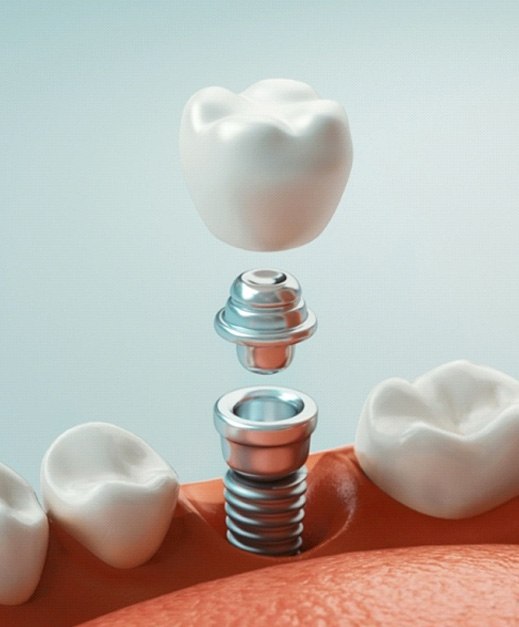
Depending on the details of your situation, the dental implant process may take several months to a year or longer. However, trust us when we say this solution is worth waiting for! To ensure you receive high-quality care, Dr. Fraser works with the best periodontists and oral surgeons in the area. She’ll walk you through the process during your appointment, but here are the four basic steps:
Initial Dental Implant Consultation

Dr. Fraser examines your smile and evaluates your candidacy for dental implants. During this appointment, you can expect that she will use diagnostic imaging in combination with a visual examination to determine the state of your teeth, gums, and jawbone. If no signs of tooth decay, cavities, gum disease, or jawbone deterioration are evident, you will be cleared for oral surgery. However, if your mouth is not healthy enough to support dental implants, you will be recommended for gum disease treatment, tooth extraction, bone grafting, a sinus lift, or ridge augmentation, depending on your needs.
Dental Implant Surgery

We refer you to a trusted specialist who surgically inserts the implants into your jaw. This process involves receiving local anesthesia to numb the areas of your mouth that will be receiving the dental implants. They will then place each implant into the corresponding location after creating one or more incisions in the gums. Once placed, they will close the gum tissue and place protective healing caps over the implants before sending you home to recover.
Dental Implant Osseointegration/Abutment
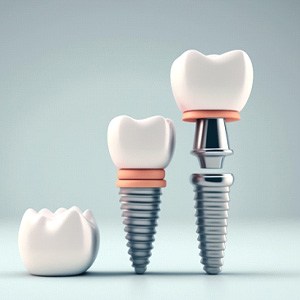
When returning home from your procedure, you’ll have a set of guidelines to follow to ensure a healthy recovery. During this time, the implants merge with your jawbone over three to six months in a process known as osseointegration. This must be completed before you move on to the next step, which is to receive your metal abutments. These are small attachments that are secured on top of your implants. They help to hold your customized restoration in place once it is secured.
Delivery of Dental Implant Restorations

We place your customized dental crown, bridge, or denture onto your abutments, completing your smile. You will notice that your restoration looks just like your natural teeth, allowing it to fully blend in with your smile. After a few days, you’ll begin to notice the difference these implants make when it comes to eating, speaking, and smiling. Not only will they look like your normal teeth, but they’ll function just like them as well.
Benefits of Dental Implants

Dental implants are the gold standard of modern tooth replacement, so much so that dentists place 500,000 of them yearly. It’s only natural – these metal posts rely on a unique and special placement method. As a result, they have perks that dentures and dental bridges can’t match and raise your quality of life. We at Columbus Dental Arts will gladly tell you more about these amazing upsides. For details on the benefits of dental implants, please keep reading or call our office.
Day-to-Day Benefits

When dental implants fuse with your jaw, they’ll show their day-to-day benefits. These are:
- Seamless Results – Dental implants are capped with porcelain and don’t move around, so they blend seamlessly with your surrounding teeth. They look natural and lifelike to the point that friends and family won’t notice they’re not “real.”
- Greater Confidence – Thanks to filling your smile gaps, dental implants should bring you a big boost in confidence. Patients who get them feel more self-assured in social settings and won’t worry as much about their grins.
- Simple Oral Care – Dental implants are easier to clean than dentures or dental bridges; just care for them like natural teeth. In other words, brush them twice daily and floss between them once daily.
- Easy Eating – Once they’ve fused with your jaw, dental implants restore your bite force. That means they’ll strengthen your jaw enough to chew tough foods!
Health Benefits

Aside from their everyday upsides, dental implants improve your health in various ways. These include:
- Greater Oral Health – If left unchecked, smile gaps let harmful bacteria breed and grow in your mouth. This process elevates your risk of tooth decay and gum disease. However, dental implants fill the gaps and protect your oral health.
- Stronger Jaw – When tooth loss goes untreated, it causes your jaw to erode until you suffer facial collapse. That said, dental implants prevent and even reverse this erosion.
- Support for Teeth – Over time, smile gaps can tilt your other teeth until they fall out of your mouth. Still, dental implants fill those spaces to prevent such tilting.
- Superior Nutrition – Since they help you chew tough foods (see above), dental implants expand your dietary options. This greater range of meal choices boosts your nutritional health.
Long-term Benefits

Given proper care, your dental implants should show long-term benefits. Such perks are:
- A High Success Rate – When placed by a qualified dentist, dental implants tend to succeed in the long run. They even have a success rate that’s over 98%!
- Long-Lasting Results – The average dental implant lasts 15-20 years or so. Meanwhile, a well-maintained one can have a lifespan of 30+ years. Either period would ensure your treatment results last a lifetime!
- Cost-Effective Care – Dental implants save you money when they get daily maintenance. Due to their long lifespans (see above), they hardly ever need repair or replacement work. Given that fact, they don’t involve costly follow-up work like dentures and dental bridges can.
Who Dental Implants Can Help

No matter how many teeth you’ve lost, you can likely qualify for dental implants. Being a proper candidate just requires that your mouth is in decent shape and good health. Really, the degree of tooth loss only affects how your implant treatment will proceed. Our team can move forward with the best implant methods once we’ve examined your mouth closely. To learn more about dental implant candidacy, please keep reading or call our office soon.
Who is a Good Candidate for Dental Implants?

While almost any healthy adult can get dental implants, the posts do have requirements. You’ll need three key qualities to be a good candidate, including:
- Good Overall Health – Dental implant placement is a surgery, so your body must be healthy to bear it well.
- Great Oral Health – You should treat prior oral issues before implant surgery, as unaddressed cavities and gum disease can cause implant failure.
- High Jaw Density – A patient’s jawbone must have high density for dental implants to fit well. Lacking that density means your jaw won’t hold the metal posts securely.
Rest assured, you can become an implant candidate later if you lack the qualities above. You’ll just need to get some preliminary procedures first – services like gum disease therapy, tooth extractions, etc. If you’d like, our team can even help you schedule those options. You’ll then become a good candidate, and we can implement treatment around how many teeth you’ve lost.
Missing One Tooth
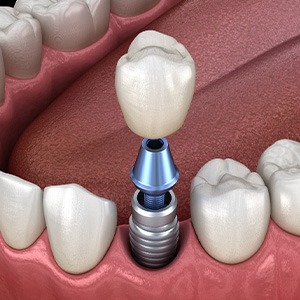
When missing one tooth, you can get by with a single implant post and crown. These prosthetics can be placed between two healthy teeth without disturbing mouth tissues. Plus, they’d be less invasive than a normal dental bridge; dentists won’t have to shave nearby teeth for placement. The results would also be sturdier, last longer, and blend seamlessly with your smile.
Missing Multiple Teeth
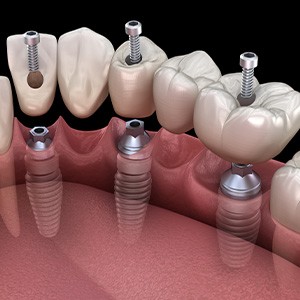
In general, our office will suggest an implant bridge if a patient lacks multiple adjacent teeth. This device secures itself with implant posts instead of “abutments” (i.e., nearby natural teeth). Due to this trait, dentists don’t have to remove enamel when placing an implant bridge. The appliance should also last longer than a regular dental bridge would.
Of course, we could place a partial implant denture instead if the missing teeth aren’t adjacent. This device anchors itself with only a few dental implants.
Missing All Teeth
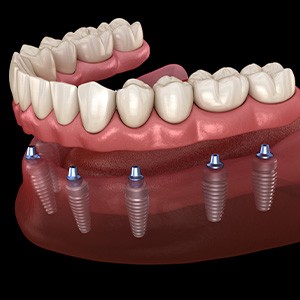
Overall, the best option for patients who’ve lost all (or nearly all) their teeth is an implant denture. This appliance uses only 4-6 dental implant posts to secure a full arch of replacement teeth. Thanks to that design, it won’t slip around, fall, or lose its fit like a regular denture. Instead, it’ll remain stable and steady for many years, so long as the patient cares for it with daily maintenance.
Understanding the Cost of Dental Implants

Because every treatment is different, the cost of dental implants varies from one patient to the next. Multiple factors have to be considered, including the number of implant posts you need, the type of restoration you’re getting, and any preparatory procedures required. Our team will work with you to find solutions for replacing your missing teeth without breaking the bank!
It’s worth mentioning that since dental implants can last a lifetime, they’re more cost-effective in the long run than bridges and dentures that must be replaced every decade or so. Combined with the numerous day-to-day and health benefits that dental implants provide, they’re definitely an investment worth making!
Preliminary Treatments & Dental Implant Surgery

It may be necessary for you to receive preliminary care such as gum disease treatment, tooth extraction, or bone grafting before moving ahead with dental implant surgery. If any of these services are recommended, they will be added to the total cost. Fortunately, many of these treatment options are partially covered by dental insurance.
When it comes to dental implant surgery, this incurs its own fee, including where the implants are placed within the jawbone and if sedation is required in addition to anesthesia. Since our office partners with local implant specialists for the placement portion of treatment, you can expect to receive a separate bill from their office but will make sure that you know what you can expect to pay before the day of your procedure.
The Parts of Your Dental Implant

- The Number of Dental Implants – If you only need one dental implant as opposed to four or six for an implant denture, you can expect it to cost much less. However, it’s important to remember that even with an implant denture, this solution is more cost-effective than replacing each tooth separately.
- The Type of Restoration – The smaller the restoration, the less expensive it will be. For example, a single crown is cheaper to produce than a custom denture.
- The Size or Material – Dental implants come in various sizes and are made of different materials. Based on your needs, you may need a longer or shorter implant post, each having its own cost. The same can be said for materials, as zirconia and titanium – the two most popular – have different prices.
- The Brand – Dental implants have many different manufacturers, each of which caters to a patient’s unique needs. Our team will be happy to discuss where our dental implants are made as well as any brand-specific details should you like to know more.
How Dental Implants Can Save You Money

We understand that cost is often a substantial factor when determining whether to pursue dental implants, especially since there are less expensive options available (i.e., dentures and dental bridges). However, you should consider that although the one-time cost of dental implants is higher, they are much more cost-effective in the long run. This is true because:
- Dentures and dental bridges often need to be replaced every 5-10 years.
- You will likely need to purchase denture adhesive to help stabilize your prosthetics.
- You will reduce your chances of developing gum disease, tooth decay, and bone loss, all of which can be costly to treat over time.
- Dental implants can minimize the price that is often required to treat systemic issues commonly linked to tooth loss, such as osteoporosis, diabetes, and other cardiovascular diseases.
Does My Dental Insurance Cover Dental Implants?

Some dental insurance companies are now providing some form of coverage for dental implants; however, many still do not. There are some exceptions, which you can inquire about with the help of our team, though. Also, you may find that other aspects of your treatment (i.e., preliminary care and your customized restoration) are partially covered by your insurance plan. Our team will review your policy and work to maximize any available benefits you have to help you save.
Making Dental Implants Affordable

If private dental insurance is not something you have, our team at Columbus Dental Arts will work with you to craft a payment plan that allows you to stay within your budget. We want to make sure you can move forward with treatment without the added stress of trying to come up with the money to fund your new smile. Just ask a member of our team how we can build a plan that is right for you.
